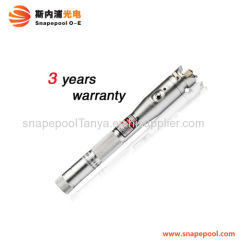
SNP3105P-1S Pen-type Visual Fault Locator VFL
| Min. Order: | 1 Piece/Pieces |
|---|---|
| Payment Terms: | T/T, WU |
| Place of Origin: | Zhejiang |
Company Profile
| Location: | Ningbo, Zhejiang, China (Mainland) |
|---|---|
| Business Type: | Manufacturer, Trading Company |
| Main Products: | CATV Products, Fiber Optic Products |
Product Detail
| Model No.: | SNP3105P-1S |
|---|---|
| Brand Name: | Snapepool |
Product Description
SNP3105P-1S Visual Fault Locator
This type VFL is specially designed for field personnel who need an efficient and economical tool for fiber tracing, fiber routing and continuity checking in optical networks. It finds breakpoints, poor connections, bending or cracking in fiber optic cables; and it can find faults in an OTDR dead zone and is used for end-to-end visual fiber identification.
Applications
Maintenance in telecom, CATV
Test Lab of optical fibers
Fiber routing and continuity checking in optical networks
Other fiber optic measurements
Features
2.5mm universal connector, for 1.25mm connectors,
FC (male)-LC (Female) adaptor also can be provided on request
Operates either in CW or Pulsed mode with constant output power
Low battery warning
Long battery life (up to 60 hours)
Drop-resistant and dust-proof design of laser head
Laser case ground design prevents ESD damage
Portable and rugged
Easy to use
Product Description
The Visual Fault Locator launches 650nm visible laser light into the fiber.
When the light encounters a break or sharp bend, it scatters, and the scattered light can be observed emerging from the cable. The Visual Fault Locator can locates breaks in short patch cords, which an OTDR cannot detect due to their operating dead zone. A fault locator is also much cheaper than an OTDR.
However, they are not recommended for using with dark-colored or armored cables.
The Visual Fault Locator can be operated in either continuous wave mode (CW mode) or in pulsed mode. Pulsed mode aids in locating faults under high ambient light conditions and improve battery life. It also could be used in checking connector quality. Often a connector may appear to be perfect. But inside the connector ferrule itself, poor gluing or dirty may create a microbend in the fiber. This microbend will produce excess insertion losses or return losses, and may result in premature failure of the connector. As the visual light launches through the fiber, it emerges from the connector in question, one can readily see the distortion as a series of rings superimposed on a normal output. Bending or twisting the fiber may affect the overall intensity pattern, but not the ring pattern itself.
Specification
Model | SNP3105P-1S | ||||
Central wavelength | 650nm±10nm (635nm is available on request) | ||||
Emitter type | FP-LD | ||||
Output power | 5mw | 10mw | 20mw | 30mw | 40mw |
Laser Range | ≥5km | ≥10km | ≥20km | ≥30km | ≥35km |
Optical connector | 2.5mm universal connector, for 1.25mm connectors, FC (Male)-LC. (Female) converter can be provided on request | ||||
Operating model | Both CW and Pulse available | ||||
Pulse frequency | 2Hz to 3Hz / 9Hz | ||||
Power supply | 2AA alkaline batteries | ||||
Battery | LR6 AA alkaline battery | ||||
Operating temperature | -20°C to 60°C | ||||
Storage temperature | -40°C to 85°C | ||||
Dimension | 23 x 190mm | ||||
Weight | 100g (without battery) | ||||
Standard Package
Model | Includes |
SNP3105P-1S | Main unit, User Manual, Individual packing |

